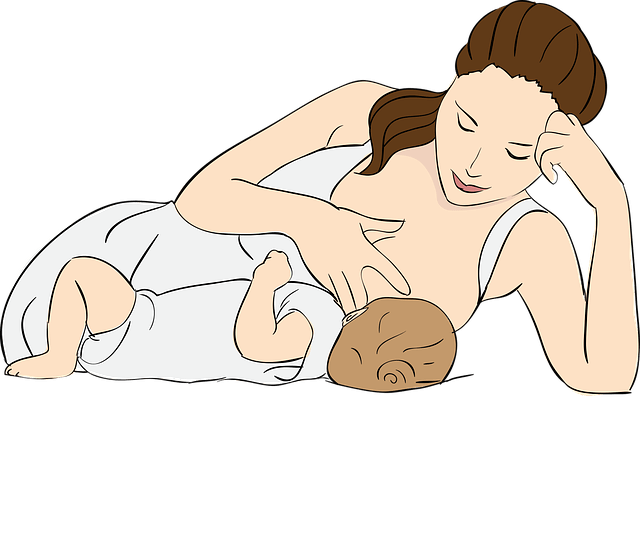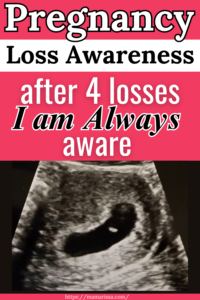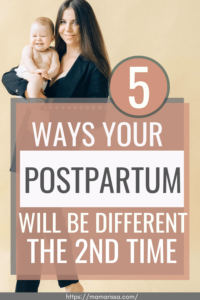Your cart is currently empty!
5 Breastfeeding Myths That Will Shock You
If you are currently breastfeeding or preparing to breastfeed once your baby arrives, you are probably doing a lot of research on the subject. You may have already stumbled across some breastfeeding myths on the world wide web, whether you realize it or not.
Breastfeeding is, without question, one of the most intriguing and awe-inspiring things a woman’s body can do (perhaps second only to growing a baby!). Naturally, everyone is curious about the topic and theories abound, going every direction imaginable.

But there are a lot of popular ideas about breastfeeding that may not be 100% accurate. The following 5 breastfeeding myths just might surprise you!
Please note that I am not a medical professional and nothing in this post is to be construed as medical advice.
Breastfeeding Myth # 1:
Breastfeeding is Cheaper than Formula
I used to question why any woman concerned about finances would choose to formula-feed her baby. Surprisingly, mothers of lower socioeconomic status are less likely to start or continue breastfeeding their babies.
This just didn’t make sense to me. But after breastfeeding my daughter for 18 months and doing some reading on breastfeeding statistics, I totally get it.
First of all, there are some tangible costs associated with breastfeeding, although they may be much smaller than the cost of formula.
You have to consider that you will need a whole new wardrobe in order to breastfeed. You will need to wear nursing tops and nursing bras virtually every day and night.
Don’t miss out on my FREE printable breastfeeding preparation checklist! Enter your email at the bottom of this post to gain access to it and other exclusive content.
And nursing apparel is not cheap. Especially if you want to look cute or have some level of variety in your closet.
Additionally, you will need a nursing cover for nursing in public, some type of nipple cream for those early days of soreness, disposable breast pads if you go that route, and you may end up needing to buy replacement parts for your breast pump at some point.
Besides these obvious expenses, there are “unseen costs” for women who breastfeed. According to Quartz, the cost of a working woman’s time spent breastfeeding for six months (with an income of $60,000 per year) would be $14,250.

Contrast this with the grand total of just $1,200-$2,000 per year to formula-feed (Source).
Now, I am a proponent of breastfeeding, and I am thrilled to be able to breastfeed my daughter. But 18 months into my breastfeeding journey, I can tell you it is a HUGE time commitment (even with a toddler some days).
I used to take breastfeeding for granted and was so proud that I did it. Until I realized I have been blessed with all the resources, tools and time that make it not only possible, but easy to breastfeed.
Many women do not have the support and finances required to breastfeed. If a new mama has to return to work a few weeks into breastfeeding and does not have any privacy to pump at her place of employment, how can she continue breastfeeding?
If that mama is relying on income from her job to support her family, she certainly can’t afford extended unpaid leave or risk losing her job by taking an extra long maternity leave.
Breastfeeding may be the “cheaper” option for stay-at-home-moms, but the expense of time is much higher than formula for working moms.
Breastfeeding Myth # 2:
Breastfeeding isn’t Working if Baby is Slow to Gain Weight
I cannot tell you how many times recently I have read about another mom who is being encouraged by her pediatrician to switch to formula because her two-week old baby hasn’t gained back his birth weight.
Every time I read this, I cringe. I can feel the panic of that mom who is scared to death that she is starving her baby by trying to breastfeed.
It is hard to question or defy your newborn’s pediatrician on an issue that can have a major impact on your tiny child’s little body.

I have dealt with this intense uncertainty in regards to other areas of my daughter’s health when she was a baby.
I remember well the feeling of determination to do what I felt was best for my child warring with the strangling fear of wondering if I was wrong.
Fortunately, in the area of my baby’s slow weight gain, unlike many of my fellow mamas, I had a lot of support from both of the pediatricians my baby saw in her first two weeks as well as my lactation consultant.
I had been exclusively breastfeeding from day one and my daughter still had not gotten back up to her birth weight by two weeks of age.
My husband and I were a little nervous about this to say the least, but her pediatrician was not concerned. Likewise, after some breastfeeding evaluation and weight checks, my lactation consultant felt things were going well.
I also met several other mamas at a breastfeeding support group who’s babies took three weeks to gain back their birth weight.
And these situations are not just anecdotal. In this California study evaluating data from over 143,000 newborns, 14% of vaginally delivered babies and 24% of C-sectioned babies had not gained back their birth weight within two weeks of birth.
This study was not specific to breastfed babies, by the way.
Pediatrician Jay Gordon wrote a blog post on the importance of looking at the baby (and the parents) instead of the scale.
He believes it is more important and more informative to notice how healthy baby appears, how well baby is nursing, and how mom and dad are built.

He provides a thought-provoking pictures of someone questioning what an ideal weight is for a 33-year-old man. Why must a baby’s health be judged strictly by a scale when we don’t even do that for adults?
To emphasize this point, when my daughter went to her 6 month check-up, she only weighed 10 1/2 pounds. This meant she had only gained 1 pound in two months and only 3 pounds since birth.
I was shocked, scared, and defeated. I thought that I had been happily breastfeeding her for six months, dillusionally thinking I had succeeded at giving my daughter the best nutrition possible.
I questioned whether I had been starving her all that time, despite the fact that she was a happy baby (aside from her reflux) and never acted deprived.
My husband even started saying we were starving her, which made me feel like a complete failure as a mom.
Then I got myself together and looked at my child, ignoring the number I had seen on the scale at the doctor. I realized what I knew in my heart all along. My happy, healthy, growing, smart, alert, thriving baby was definitely not starving.
No, she’s not a chubby baby and never has been. But she also is not the least bit scrawny or undernourished in appearance.
At her next doctor visit, her weight was up and the nurse practitioner said the scale most likely was off at her previous visit based on the uncharacteristic dip in her growth chart from that appointment.
So whether it’s because of variations in scale accuracy, the size and genetic make-up of mom and dad, or your baby’s own unique rate of growth, “failure” to regain her birth weight within two weeks is not an indication that breastfeeding is not working.

Instead of numbers on the scale, focus on your baby’s natural health indicators. Is your newborn having enough wet and dirty diapers each day? Is he alert at times? Is he feeding well with an appropriate latch?
Click here for the answers to some common new mama questions.
If your baby is checking all of the health and developmental check boxes besides attaining a certain number on the scale, try not to make any drastic decisions about ending your breastfeeding journey early.
Healthy babies don’t always gain back their birth weight within two weeks regardless of whether or not you are breastfeeding.
Breastfeeding Myth # 3:
Breast Milk is Always White
On a lighter note, I was pretty surprised in doing my research to discover that breast milk can be some rather odd colors. Although I have never experienced it personally, breastfeeding mamas may find that their milk is sometimes green, blue, red, yellow or even black!
According to Medela, a breastfeeding mom’s diet can influence the appearance of her milk.
Eating a lot of green veggies or green-dyed drinks might produce green milk, eating veggies high in beta-carotene might produce yellow milk, and eating beats or artificially colored foods might produce red or pink milk.
But there are other reasons for strange breast milk colors besides dietary choices.
Interestingly, Kindred Bravely notes that the first milk new mamas make, colostrum, is yellow because it is made up of 70% white blood cells compared with just 2% once the breasts start producing mature milk.

Similarly, when a breastfeeding mom or her baby gets sick, the white blood cell count in breast milk goes way up – sometimes even higher than when it was colostrum. Consequently, breast milk may turn yellow again during periods of illness.
Kindred Bravely also states that blue milk can simply be the color of the less fatty milk that precedes the heavier, more filling milk that is produced once baby’s thirst has been quenched.
As for red, pink or rust colored milk, this is often caused by the presence of blood in the mother’s milk.
There are many reasons why breast milk may contain blood. Some women’s breasts bleed into their milk during the first week after birth simply due to the stretching process the milk ducts go through. This is called Rusty Pipe Syndrome.
Some women may have a benign growth attached to a milk duct that causes bleeding.
One common cause of blood in breast milk is from the cracked nipples that many new moms experience until their bodies and babies get the hang of breastfeeding.
Another thing that can lead to bloody milk is having a plugged milk duct or mastitis. I expressed a small amount of blood with my milk during one of my bouts with a plugged duct.

The general consensus is that it is perfectly safe to continue breastfeeding your baby when there is blood present in your milk, but consult your doctor if you are concerned about this.
Some sources do warn that ingesting blood (particularly in larger amounts) through breastfeeding may upset your baby’s tummy.
Shockingly, breast milk can sometimes be black! This may also be caused by blood in the milk. However, black breast milk can also be the result of taking certain medications while nursing (Source).
Whatever the color of your milk, continue breastfeeding unless advised otherwise by a medical professional. And always consult your doctor if you are worried about the appearance of your breast milk to rule out any (unlikely) dangerous causes.
Breastfeeding Myth # 4:
Breastfeeding Sucks the Calcium Out of Your Bones
Calcium is one of those health topics that has been marketed to us as something that none of us is getting enough of. Especially pregnant and lactating women are encouraged to drink milk and eat cheese and yogurt to get enough of this mineral that is so important to bone health.
Read my post on the difficulty of trying to lose weight while breastfeeding here.
I don’t know about you, but I have been under the impression throughout my breastfeeding journey that during times of inadequate calcium intake, my body leeches calcium out of my bones to feed my child, and I will one day be a weak old lady with a fragile skeletal system because of this.
But the reality may be quite the opposite.
A study conducted in Connecticut evaluating osteoporosis prevalence among 619 women over the age of 49 found that, of those who had a history of breastfeeding, only 8% had the disease compared with 19% of the women who had never breastfed (Source).
The relationship between pregnancy, lactation and bone loss is still being investigated by researchers. So far, it is unclear exactly what effect pregnancy and lactation have on a woman’s bone density as she ages.
But this article reviewing numerous studies on the matter concluded that the evidence overall indicates that while pregnancy may contribute to long-term bone loss, breastfeeding appears to ultimately preserve bone density.

Additionally, according to research referenced on KellyMom.com, breastfeeding mamas begin regaining their bone density once their babies start solids and are back to normal levels within twelve months.
Amazingly, Kelly Mom also notes that if a woman conceives while breastfeeding a baby, her body will increase its bone density during pregnancy, which is not normally the case during pregnancy when bone density decreases.
Incredibly, it would appear that God created the perfect system in which our bodies are restored following pregnancy as we continue giving of ourselves (literally) to our babies through breastfeeding.
Breastfeeding Myth # 5:
Breastfeeding Produces Healthier, Smarter Children
The benefits of breastfeeding are emphatically stated everywhere you look. Babies are promised to have brighter futures and better health outcomes because of being breastfed. And there’s plenty of research to back it up.
However, recently there has been more and more speculation emerging about how informative these breastfeeding studies really are.
I firmly believe that the foods we find in nature and eat in their natural forms are the healthiest dietary options available and eating them will lead to better health than eating processed “foods” that do not ultimately nourish our bodies.
I feel the same about what an infant eats. I believe the natural food for a baby is breast milk and man-made alternatives simply aren’t capable of duplicating or equaling God-made nutrition.
But it has become apparent that the known benefits of breastfeeding for your baby may have been somewhat skewed by one major problem: socioeconomic status of the mother.

According to this study, women who choose to breastfeed tend to be white, married, educated and financially stable.
Because of these characteristics, these women’s babies are bound to have better health and intellectual outcomes. Therefore, how can we know for sure that breastfeeding is what positively impacted these children in these ways?
Quartz references a study which compared babies of mothers who breastfeed with babies of mothers who intended to breastfeed but did not end up doing so. The study found no health differences between these two groups of infants.
What was notable about the study was the fact that the intention to breastfeed in and of itself resulted in healthier children.
This indicates that the mother’s position in society and subsequent access to information and healthcare are more responsible for babies’ health outcomes than breast milk itself.
(It is important to realize that this study has many limitations as mentioned by Quartz and that there are a lot of studies proving the benefits of breastfeeding).
In another study referenced by Quartz, families were evaluated who had at least one breastfed and one non-breastfed child and no different health outcomes were noted among siblings.
Although I am all about breastfeeding and have no doubt in my own mind that it is the most perfectly matched nutrition for a baby’s needs, it seems that the ultimate health and well-being of a child has more to do with the family he grows up in than what he consumes as an infant.
Hence, while breastfeeding definitely is nutritionally amazing, the intensity with which breastfeeding advocates lavish us with breastfeeding benefits might need to be tempered somewhat. And formula-feeding moms most certainly should not be shamed.

The Breastfeeding Myth Within Yourself
So what concise piece of wisdom can we take away from these random breastfeeding myths? Here is what I would offer as a takeaway:
The greatest breastfeeding myth lies within your own mind.
It’s the myth that tells you that breastfeeding isn’t working for you because you don’t have the happiest baby on the block.
It’s the myth that tells you that you are less of a mom because you are not breastfeeding.
It’s the myth that tells you that you’re just not doing good enough no matter how you feed your baby.
Don’t listen to this breastfeeding myth speaking lies into your mind.
Do you care about filling your baby’s empty tummy with something that will help her grow big and strong?
Do you get up day and night to give your child nourishment even when you don’t feel like it because you love her and recognize your responsibility to protect her and meet her needs?
Yes? Then you are doing just fine, Mama.


6 responses to “5 Breastfeeding Myths That Will Shock You”
[…] Read 5 Breastfeeding Myths That Will Shock You here! […]
[…] my first baby and are now confused about the numbers on the scale. After all, there are plenty of myths surrounding breastfeeding out […]
[…] Discover 5 Breastfeeding Myths that Will Shock You in this post. […]
[…] 5 Breastfeeding Myths that Will Shock You […]
Very good article! I learned several things that I did not know from reading this!!
Sue,
Thank you! I’m glad you found it informative 🙂










Leave a Reply